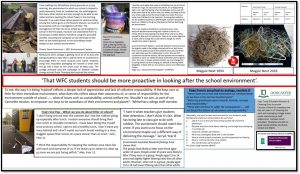“The Whitefriars students should be more proactive in looking after the environment”
The Sustainability & Environment Team have been working with the Year 8 English staff to develop a persuasive writing piece that connects the students to their college environment. Biodiversity, water, energy and waste issues were discussed and after asking the Environment Captains, Roger and Yianni, their perspective on litter, the persuasive writing piece is centred around College waste.
“I love walking into Whitefriars school grounds on a crisp morning, the environment in which our school is located is really awesome, fresh air, kookaburras, the odd kangaroo. Not many other schools are lucky enough to be able to see native animals roaming the school freely in the morning, however if we want these native species to continue living among the manna gums in the Mullum Mullum, we need to be proactive with our management of litter. The management of litter can be as simple as not bringing it to school in the first place, however we understand that it is not always a viable option, therefore using bins provided (landfill, recycling and compost) we can eliminate all the litter on the school ground, in turn providing a lesser impact on our schools environment”. (Yianni Komninos)
“Waste at Whitefriars is hard to solve, when everyone decides that throwing their rubbish in the bin is a choice that they can choose to do, there is always going to be these times where you allow yourself to litter and not use the bin. There is not a clear objective to solve, and to change this would need to change our whole viewpoint on waste in general. I get the feeling, when the bell goes and you are still at the other side of the school with your mates, and needs to finish your snack, trek across the school to get your books from your locker then trek back to the classroom, throwing that rubbish in the bin suddenly becomes an afterthought. We all don’t purposefully leave our rubbish on the ground because we felt like destroying the environment today, we do so when optimising for other, more important things in our minds. As an Environment Captain, I would be calling for everyone to put the organic waste in the college compost and so on, but I know that it can be tedious to go to the compost every day, but at the very least make sure the rubbish goes in A bin. Bins are NOT uncommon around the schools, we have pockets and we need to use them to carry our wastes for about 20 seconds until we get to a bin. This is by no means a direct solution, we must change this by calling others out and changing our attitude to leaving waste altogether. It starts with our own actions, and our own little steps”. (Roger Luo)
Later in the term, the Year 8 students will be reflecting on the Captains message and writing a persuasive piece on why and how they can protect their environment by taking ownership of their litter. When students return to the College, the Sustainability & Environment Team encourage families to minimise waste in lunchboxes and snacks. This is a simple, yet very effective solution to minimising College waste.

IPCC (Intergovernmental Panel on Climate Change) Report
Roger Luo, the college Environment Captain, was dismayed that the IPCC was not common knowledge amongst his peers. Roger has suggested all students should be become informed. “It is depressing but true and needs to be shared.” (314) Why everything will collapse – YouTube and The New UN Climate Report: We’re Screwed – YouTube. Although it is depressing, Roger wants to focus on the solutions and good news stories, like kelp farming for example. The college’s Sustainability & Environment Team support Roger in his commitment to informing and having discussions around the climate crisis with the college community.
What is the IPCC?
The latest United Nations Intergovernmental Panel on Climate Change report was published last week. Over 200 climate scientists contribute to the report that provides scientific information relevant to understanding a warming climate and the impact and risks on world health, economy, agriculture, populations and the environment. The earth has warmed 1.10C since 1990 due to increased human made greenhouse gas emissions. If it continues to warm at this unprecedented rate, the planet’s response to higher temperature will be loss of ice sheets and glaciers, sea level rises, acidic oceans, increased severe storm and fire events, droughts, flooding, biodiversity loss, refugees and food security issues. It is a bleak scenario. The IPCC report is critical as it provides global solutions to a warming climate and urges world leaders to adopt these to keep the warming global climate to 1.5oC. World leaders will meet in October this year for the UN Climate Conference (COP26). Climate scientist predict this meeting is critical for world leaders to commit to reducing emissions and adopting solutions before it is too late to reverse the impacts of the climate crisis.
Want to know more?
Climate council – what does the latest IPCC report mean?
What does the IPCC’s report mean for Australia, and what can we expect in the future?
Jo Menzies
SET Coordinator

